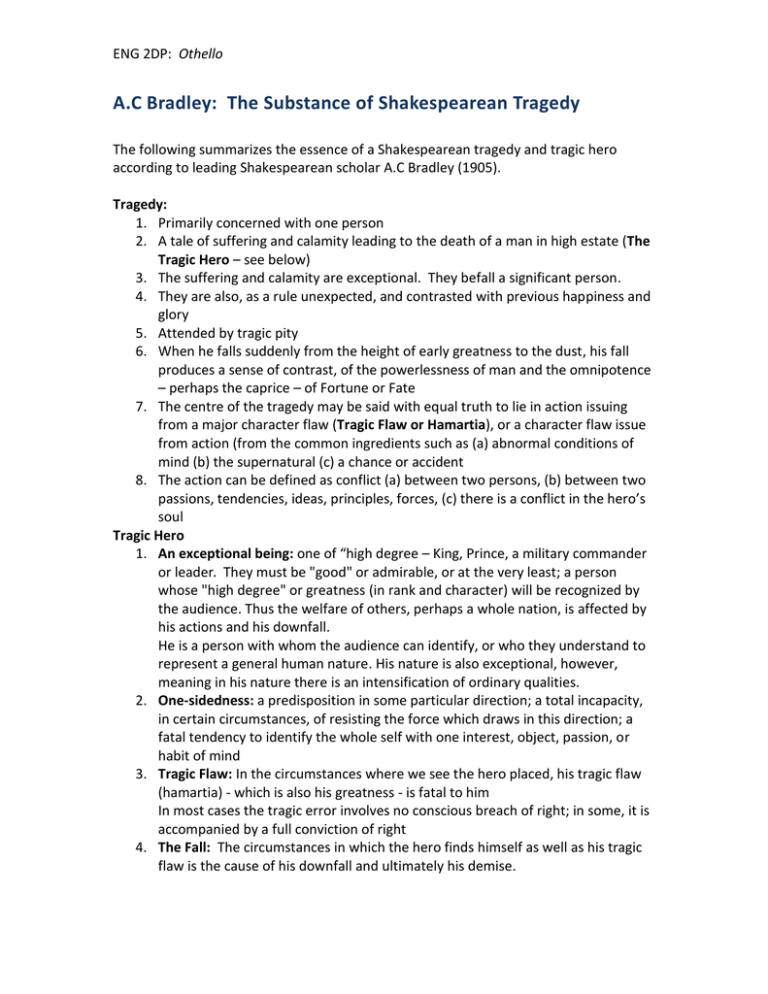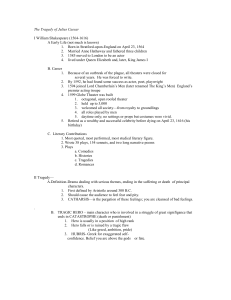A.C Bradley: The Substance of Shakespearean Tragedy
advertisement

ENG 2DP: Othello A.C Bradley: The Substance of Shakespearean Tragedy The following summarizes the essence of a Shakespearean tragedy and tragic hero according to leading Shakespearean scholar A.C Bradley (1905). Tragedy: 1. Primarily concerned with one person 2. A tale of suffering and calamity leading to the death of a man in high estate (The Tragic Hero – see below) 3. The suffering and calamity are exceptional. They befall a significant person. 4. They are also, as a rule unexpected, and contrasted with previous happiness and glory 5. Attended by tragic pity 6. When he falls suddenly from the height of early greatness to the dust, his fall produces a sense of contrast, of the powerlessness of man and the omnipotence – perhaps the caprice – of Fortune or Fate 7. The centre of the tragedy may be said with equal truth to lie in action issuing from a major character flaw (Tragic Flaw or Hamartia), or a character flaw issue from action (from the common ingredients such as (a) abnormal conditions of mind (b) the supernatural (c) a chance or accident 8. The action can be defined as conflict (a) between two persons, (b) between two passions, tendencies, ideas, principles, forces, (c) there is a conflict in the hero’s soul Tragic Hero 1. An exceptional being: one of “high degree – King, Prince, a military commander or leader. They must be "good" or admirable, or at the very least; a person whose "high degree" or greatness (in rank and character) will be recognized by the audience. Thus the welfare of others, perhaps a whole nation, is affected by his actions and his downfall. He is a person with whom the audience can identify, or who they understand to represent a general human nature. His nature is also exceptional, however, meaning in his nature there is an intensification of ordinary qualities. 2. One-sidedness: a predisposition in some particular direction; a total incapacity, in certain circumstances, of resisting the force which draws in this direction; a fatal tendency to identify the whole self with one interest, object, passion, or habit of mind 3. Tragic Flaw: In the circumstances where we see the hero placed, his tragic flaw (hamartia) - which is also his greatness - is fatal to him In most cases the tragic error involves no conscious breach of right; in some, it is accompanied by a full conviction of right 4. The Fall: The circumstances in which the hero finds himself as well as his tragic flaw is the cause of his downfall and ultimately his demise. ENG 2DP: Othello It is necessary that he should have so much greatness that in his error and fall we are made vividly conscious of the possibilities of human nature. And with this greatness of the tragic hero is connected the centre of the tragic impression: that of tragic waste.

